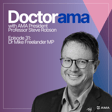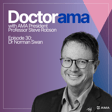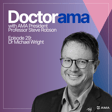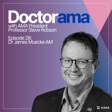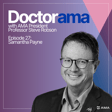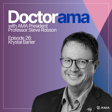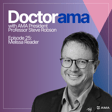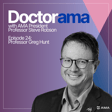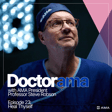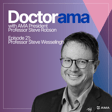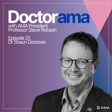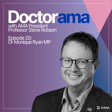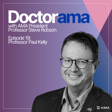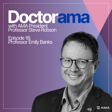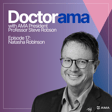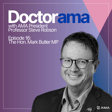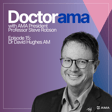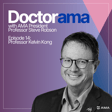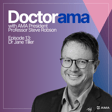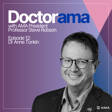Become a Creator today!Start creating today - Share your story with the world!
Start for free
00:00:00
00:00:01

Episode 8 - Professor Terry Slevin
In episode 8 of Doctorama AMA President Professor Steve Robson chats with Professor Terry Slevin.
Recommended
Transcript
Establishment of the Australian CDC
00:00:00
Speaker
Next year, there's going to be a very profound change in the way public health is managed in Australia with the development of the Australian Centre for Disease Control. But what's it all going to mean for public health practice? My guest today, Dr. Rama, is going to share some thoughts and we'll see if we can learn what we can. You're listening to Dr. Rama with Steve Robson, bringing you the best of health, medicine and people.
Terry Slevin's Career Journey
00:00:29
Speaker
My guest today is Professor Terry Slevin from the Public Health Association of Australia. Welcome to Dr. Arma Terry. Hello, Steve. Thanks for having me. Terry, I gather that your background, you're the Chief Executive Officer of the Public Health Association of Australia, but your background is in psychology. Tell me a little bit about that transition from psychology to public health.
00:00:50
Speaker
Sure, Steve, I guess it started, my involvement in public health started in student politics in truth. I was president of the University of Newcastle Student Representative Council, and also the University Union, you know, so the place where you buy your beer and your chips and your gravy. That doesn't sound very, very healthy, Terry.
00:01:10
Speaker
No, no, it wasn't. And I confess at that stage of my life, I wasn't championing the closing of the bar or the improving of the menu at the refectory at University of Newcastle. About my time again, I might have had a crack at it, but I'm not sure how successful I'd be.
Influence of Personal Background on Public Health Focus
00:01:25
Speaker
So I guess there's something inside me that kind of thinks, if you like, about
00:01:33
Speaker
politics and power structures and decision making and who gets to have a say. So my psychology career was, if you think of classic clinical terms, very short lived. I figured sitting in a small dark room with another person and hearing about their problems was probably not the way in which I wanted to spend my life. But I did have a background in understanding
00:01:54
Speaker
population health and the things around us and the role that that played in our health. My old man was an alcoholic very sadly and that had a big impact on my family. He was a smoker, but he was a very, very good man and it was the environment which he grew up. He's an Irishman and I suspect you know all of the
00:02:14
Speaker
Level of emotional kind of engagement that management of that generation had but and when he was solving his problems he turned to the bottle and of course as a young fella started smoking and continued until his death in his early sixties of.
00:02:29
Speaker
probably a combination of alcohol and tobacco related disease. But I suppose that kind of turned my thinking to the environment in which we all exist, the environment that influences health, our health choices, but also health broadly of the community. It's not just about individual choices.
Initiating Public Health Campaigns
00:02:50
Speaker
So that took me on a path of firstly running the quick campaign in Newcastle, my hometown.
00:02:54
Speaker
where I moved from student politics and talking about students' health into tobacco use in students. And then the local drug and alcohol service and the Hunter Drug Advisory Service started, got some money for, I think it was eight months and I was paid for 30 hours a week to start up the quit campaign in my hometown. And that started me on a path in
00:03:16
Speaker
April 1984, so closing on 40 years. I've been banging this drum, Steve. 40 years is a long time. I think you spent some time in Perth. Have I got that right? Yes. When I was running the Quit for Life campaign in New South Wales, the state government, Nick Greiner, was premier. And it was frustratingly tokenistic, I thought, as an ambitious and I think impatient young bloke.
00:03:46
Speaker
And New South Wales Health and I parted ways when a job came up in Perth to run the ratbag outfit called the Alcohol Advisory Council. It was a small two-man show funded by Healthway, the Health Promotion Foundation, and it was a chance to talk about alcohol policy.
00:04:03
Speaker
and to influence, I hoped, government policy when it came to alcohol. So I left New South Wales government to go to Perth and be a ratbag on alcohol, and Nick Greiner left New South Wales government to go and sit on the board, and I think ultimately chair the board of WD and H.O. Wills for memory.
00:04:20
Speaker
And I kind of looked over my shoulder and thought, well, that was probably a good call. But I spent 26 wonderful years in Perth, both my, well, my daughter was four months old when we went over, my son was born there, and they still live in Perth, and it's a beautiful part of the world. And I learned a lot about public health from a lot of the doyens of public health in Western Australia, where there's still a strong feature of the health system. Yeah, absolutely.
Role and Focus of the Public Health Association
00:04:47
Speaker
Terry, you're now the CEO of the Public Health Association of Australia and I suspect a lot of our listeners don't know a lot about the organisation. My sense is it's very diverse. Can you tell me a little bit about the organisation?
00:05:01
Speaker
Sure, we're a member-based organisation. We've got about 2,000 members, both individuals and organisations. I'm pleased to see your shop, AMA, has been a member of ours for a while. Well done. But also academic institutions, people who work in the not-for-profit. So the membership is made up of academics, people who work in government, people who work in not-for-profit sector, students, as I mentioned, organisations.
00:05:24
Speaker
And it's a kind of a weird outfit because our members give us money for the privilege of doing more work for free that benefits other people and i say that to every decision maker i make politician bureaucrat and i think it's important because people understand that my members of the not for their own benefit that i get cheap.
00:05:43
Speaker
deals on their mortgages or their car loans, nor do they get industrially represented by us and they don't get a monthly wine deal. They're there to stand out for public policy and public health that's based on evidence. We run a journal, Australian New Zealand Journal of Public Health, we're very proud of. More than a million downloads a year happen from the data that's published in our journal.
00:06:05
Speaker
And ultimately, our objective is to translate good science into good public policy for best health outcomes possible.
Potential Impact of the CDC on Australian Public Health
00:06:15
Speaker
So Terry, you and I both spent a lot of time, I guess, talking with people at health in the minister's office and so on.
00:06:24
Speaker
about the forthcoming Australian Centre for Disease Control. But I was wondering if you could talk me and our listeners through what the changes are going to be when we have an institution. How's it going to alter the way things are done compared to the way things are done at the moment? Well, that's uncertain at the moment, Steve. But I've got to give you a little bit of a history and run-up lesson before we start talking about how the CDC is going to change Australia and the world, and I hope it does.
00:06:53
Speaker
But it's interesting to reflect on the fact that the Commonwealth Department of Health was established in 1921, and it was established off the back of two things. The first was the First World War, where doctors looking after the soldiers in the army in the First World War realized that it wasn't bombs and bullets and gas that were killing our soldiers, but it was public health-related issues. It was infections, it was malnutrition, it was things like smoking and the like.
00:07:21
Speaker
So they came to realise that looking after the health of the soldiers certainly, you know, send them into battle as well prepared as they could do, but ultimately being well prepared as being healthy. And a lot of them weren't around that time. And so they absolutely brought the lessons of public health back from the war and figured that the same principle should apply to the Australian population.
00:07:45
Speaker
Now, around that time, we also had a little thing called the Spanish flu pandemic, which we've all kind of referenced and learned a bit more about over the last few years. And so that further reinforced the importance of establishing a national health body because up until that time, one didn't exist.
00:08:03
Speaker
There's a fellow by the name of John Conston who advocated for the establishment of a Commonwealth Department of Health and he became its first director and he was so from 1921 to 1945. Imagine being the head of the Australian Department of Health for that period of time these days. And it's interesting to list the things that they did, Steve. So this is what it was set up to do. It was set up for the Administration of the Quarantine Act, for the investigation of cause of disease and death,
00:08:28
Speaker
the establishment of laboratories, control of the Commonwealth Serum Laboratory, collection of sanitary data, investigation of health in industry, education of the public in public health.
00:08:40
Speaker
control of the Australian Institute for Tropical Medicine and control of infectious diseases amongst former members of the ADF. So that's probably not a bad starting point to think about in terms of the scope of the CDC now or in 20 and we're going into 2024. And we went into the last federal election knowing full well that the conservative side of politics was determined not to establish the CDC. They said things are fine. We have the infrastructure in place. We don't need it.
00:09:09
Speaker
But Labour committed to establishing a CDC when Chris Bowen was Shadow Health Minister. And now it's Mark Butler's responsibility to make it happen. So what's it going to do, Steve? How's
Consistency and Efficiency in Public Health Policy
00:09:23
Speaker
it going to make a difference? Well, the starting point is through the pandemic, we all learned that the states had the responsibility for on the ground.
00:09:30
Speaker
Execution of public health policy. We saw border closes. We saw different policies with regard to restrictions, lockdowns and various controls because the head of power exists in those state legislation.
00:09:42
Speaker
and does vary from state to state, and some states have quite old public health legislation. Commonwealth's role is to help that work better, and there's a number of structures that are important to make that work. There's, for example, CDNA, the Communicable Disease Network of Australia, which interestingly is essentially, again, a group of volunteers. They are people in the jurisdictions who have responsibility for communicable disease protection, planning, and the like.
00:10:09
Speaker
And they come together nationally to cooperate. And there's a secretariat in the Commonwealth Department of Health, but it's still the responsibility mostly of the states to do the doing. So as a starting point, the CDC needs to be doing more doing when it comes to that stuff.
00:10:25
Speaker
formulating consistent policy, the extent to which they can achieve that, without taking the powers from the jurisdictions, but also ensuring a greater level of efficiency and consistency. Now, we all look at our phones and around that time, if we moved around, we had different check-in apps and various other devices to deal with each of the setups that were created by the jurisdictions. Some of them work well, some of them less so, but there's a lot of duplication, there's a lot of inefficiencies.
00:10:54
Speaker
So getting those things right, consistency of data, capture, reporting, definitions, but also maximising the extent to which there was consistency in cooperation across the states. Now, all of this, Steve, should be said in the context of absolutely heroic efforts from those people over that period of time. And you and I both know many of them who
00:11:13
Speaker
working 20 hours a day consistently for 12, 18 months, even two years. There's an extraordinary effort by those folks. So nothing in what I say should be a criticism of them. But I think everybody would agree there were a whole bunch of stuff we could have and should have done better.
00:11:30
Speaker
politics has been an issue in public health in this country. And do you think that an ACDC, I love the term ACDC, has the opportunity to help take politics out of decision making and action?
CDC's Independence and Political Challenges
00:11:44
Speaker
Well, to get our highway to health, Steve, my argument is that politics is a reality of public health that always has been and always will be. So let's not pretend we can take it out.
00:11:55
Speaker
But the notion of the CDC and the discussions we've been having are about its independence and what does that mean and how will that work as a Commonwealth Government agency, that's what it is. But how can it look people in the eye and say we are providing this advice on the best available evidence and with the interest of the health of the population in mind and those are the only things that drive our advice.
00:12:20
Speaker
nothing else. We don't need to be re-elected. We don't need to look good in front of the public. And we need to be prepared to provide unpopular advice. And of course, we all know that politicians always struggle with unpopular advice or unpopular decisions. It's the nature of the political system. So the extent to which the CDC can establish itself is independent, it will be determined by its governance structure. It needs to have a strong independent board chair and a strong board that can back
00:12:51
Speaker
the leadership of the entity, so as to make those hard decisions, those hard recommendations and do so publicly, but do so with credibility and the resources that allow that to be so. So we think that's an important component of the design of the CDC and that's the thinking that's going on now.
00:13:11
Speaker
So if we look around the world, Australia is one of the last places to actually institute a CDC. What lessons do you think we can take from the function and history of CDCs in other comparable countries to this? Do you think we can learn lessons,
Learning from Global CDCs
00:13:29
Speaker
Terry?
00:13:29
Speaker
Oh, absolutely. There's enormous amount to be learned. I mean, I know Paul Kelly, Chief Medical Officer, is fond of saying that the city said in the US started in one state and focusing on one disease and it grew and evolved to what it became. But clearly in the circumstance where the Trump presidency really did
00:13:48
Speaker
demean and diminish the influence and capacity of the CDC to do its job through the pandemic. History books will, I'm sure, show that. But there's recently been developments of the African CDC, the Japanese are in the process of putting one together in a very Japanese kind of way. I've given themselves five years to do the planning and establishment of it.
00:14:08
Speaker
European CDC is another one, and they're dealing with the challenge of dealing with a number of countries across Europe and all of the, I guess, complexity that goes with that. But people are genuinely thinking about how to do this, how to do it better, and how to make sure that we can create the kind of entity that serves Australia well in the context of our federated system. But we are an island nation, and there's a whole bunch of advantages to that. There's not a great big moat around us, certainly helped us during the pandemic.
00:14:38
Speaker
How do we make the best advantage of that? But how do we also ensure that we build in the capacity to share our expertise with our neighbours near and further? The Asia Pacific region is an area where Australia can and should play a leadership role. So those are the things that certainly should be designed into the thinking for the CDC.
00:15:00
Speaker
Yeah, I agree with you. I think that we're perfectly positioned to help and to be, I guess, a big sibling to a lot of Pacific countries who struggled. I know that there were tremendous struggles.
00:15:15
Speaker
in Papua New Guinea in dealing with the pandemic and we're well suited and I think we have a lot of expertise and I certainly agree with you about that leadership role, Terry. So I guess moving forward, one of the big things that I always harp on about is that a lot of disease that we treat and we spend a lot of money treating in the Australian health system is essentially preventable. Do you think the CDC can
00:15:42
Speaker
can really look at the social and other determinants of health and you know bring a focus on prevention to health in the country. Steve, not only do I think that it can but I think it must and it's built into its basic kind of DNA that's certainly built into the DNA of public health.
00:16:02
Speaker
Now I want to read you the words that were in the ALP pre-election committee with regard to the CDC. There's not many of them and it says an Albanese government will improve pandemic preparedness and response by establishing an Australian
CDC's Responsibilities and Integration with Policy
00:16:14
Speaker
CDC. The CDC will ensure ongoing pandemic preparedness, lead the federal response to future infectious disease outbreaks and work to prevent non-communicable or chronic diseases as well as communicable in brackets infectious diseases.
00:16:30
Speaker
All Australians will benefit from improved pandemic preparedness and response as well as a renewed focus on preventing chronic disease. And the other thing to point out, Stephen, it's pretty obvious, and you know this as well as anyone, that the two things aren't so entirely separate as to operate in different worlds.
00:16:49
Speaker
being well prepared for an infectious disease outbreak starts with being as healthy as you can be in the first place. And that means tackling those risk factors for the things we know contribute to chronic disease, overweight and obesity, alcohol, tobacco, illicit trade use, all of the things that we know undermine people's health and the things that are behind those things, the causes of the causes, if you like.
00:17:12
Speaker
poverty, homelessness, discrimination, all of those things that we know are fundamental to our human rights, but also our health and wellbeing. So the CDC has to have that kind of lens and has to run that across all the things that it does. And ultimately it has to be expert. It has to have the workforce capacity and establish a program to ensure that into the future.
00:17:35
Speaker
One of the things I've been batting pretty relentlessly for Steve is the creation of the Australian Public Health Officer training program.
Advocacy for Leadership Development in Public Health
00:17:42
Speaker
It exists in New South Wales and has been running for more than 30 years and is very successful. What it does is recruit very well experienced and best of the best, if you like, of people with an interest in the public health world, whether they're medically trained or otherwise, and then puts them through a rigorous training program where they develop expertise and connection across the New South Wales health system.
00:18:05
Speaker
They build those connections and they grow as leaders and many of the leaders of New South Wales Health have come out of that program and I think we should do the exact same at a national level. It should connect up so that people can move around Australia and get the experience from the Kimberley to Tasmania, from Bunbury in Southwestern Western Australia up to Cairns and across the country working with Aboriginal and Torres Strait
00:18:32
Speaker
technology, working on communication skills, working on the diverse range of skills that we know come together to make an effective public health system. Yeah, look, absolutely. Look, Terry, it's a pleasure speaking with you. There are so many things I want to talk to you about, everything from
00:18:48
Speaker
gambling harm to the social determinants of health and so on. So I think we need to speak again soon, but I want to thank you for speaking with me this afternoon. What are you doing on the rest of the long weekend? Have you got plans on what's left? Well, I might be building down to the Canberra Olympic pool, Steve, and try and punch out two and a half Ks, maybe three if I've got time, try and keep myself from blowing up the balloon and trying to keep the heart going.
00:19:15
Speaker
and maybe all are warped, not quite sure, depending on the opening hours for the pool. I've been friends of Canberra Olympic pool, a little mob that I established just to keep the pool going and make sure we put the pressure on the ACT government and they've been making good recent announcements on that. So I'm happy to say that I'll be able to keep on jumping in and plowing up and down and probably tweaking that.
00:19:36
Speaker
little injury in my left shoulder as well but all part of the fun of getting older stay absolutely look you're setting a fantastic example thanks terry i'm hopefully gonna be speaking with terry again soon thanks for listening to dr rama
00:19:59
Speaker
You've been listening to Dr Rama, a podcast produced on Ngunnawal country by the Australian Medical Association. All rights reserved.
